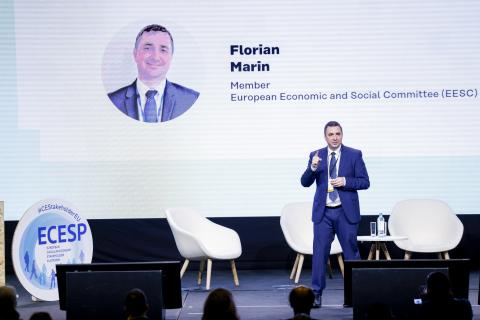European Economic
and Social Committee
EU's flagship conference turns circular economy vision into actions
This year, the European Circular Economy Stakeholder Platform (ECESP), an initiative developed and co-hosted by the European Economic and Social Committee (EESC), joined forces with the Belgian Presidency of the EU Council and the Finland-based World Circular Economy Forum (WCEF) for its flagship conference on 15 and 16 April at the Square, the Brussels Convention Centre.
More than 1000 participants and 150 speakers from around the world are gathering at a high-level conference showcasing the most impactful circular solutions worldwide, guided by the latest scientific findings. An important delegation from the EESC, has actively participated in various sessions as speakers, sharing the EESC's views and the success story of the European Circular Economy Stakeholder Platform (ECESP).
"The European Circular Economy Stakeholder Platform (ECESP) fulfils its role as the 'network of networks' by addressing these fundamental challenges", said EESC member and co-founder of the platform, Cillian Lohan. "As a joint initiative of the EESC and the European Commission, the Stakeholder Platform links the highest level of policy-making with civil society networks active on the ground. It is a 'one-stop-shop' for all things circular and an efficient space that gathers knowledge on the latest developments in financing the circular economy."
Anders Ladefoged, a member of the EESC and part of the ECESP Steering Group, said: "The ECESP showcases and discusses Europe's progress towards and gaps in circularity in dedicated EU-focused sessions. The conference is a splendid opportunity to communicate with like-minded visionaries, learn from experts in the field, and become part of the circular transition."
"There has been growing interest in the platform since it was set up, and it is gradually becoming more interactive. It enables stakeholders to engage in dialogue with policymakers through activities such as the #EUCircularTalks, providing feedback on existing policies and contributing to the development of new ones,'' said Maria Nikolopoulou, another member of the EESC and part of the ECESP Steering Group. ''Delighted to see our contribution to the World Circular Economy Forum conference in Brussels!"
With increasing global demand for natural resources, the transition to a circular economy requires predictable and coherent regional and global policies which trigger innovation and investment.To support and encourage this transition at global level, Commissioner Jutta Urpilainen unveiled two initiatives during the closing plenary of the conference: the EU Circular Economy Resource Centre, funded with €15 million, to facilitate global collaboration on circular economy policies, and the "SWITCH to Circular Economy in East and Southern Africa" programme, backed with €40 million over five years, intended to promote circular economies through capacity building, policy support and financing in target sectors such as packaging, plastics and electronics. The ECESP welcomes this momentum and will follow the initiatives closely.
Find speeches and presentation here: https://www.youtube.com/@WCEF2024
Background
The European Circular Economy Stakeholder Platform (ECESP) is a visionary initiative developed and hosted by the European Economic and Social Committee (EESC) in partnership with the European Commission. Its task is to promote the transition to a fully circular economy. By facilitating dialogue among stakeholders, disseminating good practices and strategies, and providing information on the circular economy, the platform aims to turn circular visions into actions
The EESC has actively advocated for a circular economy and has adopted several opinions and documents establishing a clear position. To accelerate the transition, in its 2015 EU Action Plan for the Circular Economy, the European Commission included measures to engage with stakeholders through existing fora and support the exchange of good practices. For the European economy to become truly circular, all stakeholders must get involved: public authorities, businesses, trade unions, consumers and civil society. This is why the platform was set up as a joint initiative of the Commission and the EESC in March 2017. Learn more about how the initiative offers a wealth of good practices for policymakers, businesses, academia and civil society and translates dialogue into cooperation. (ks)
